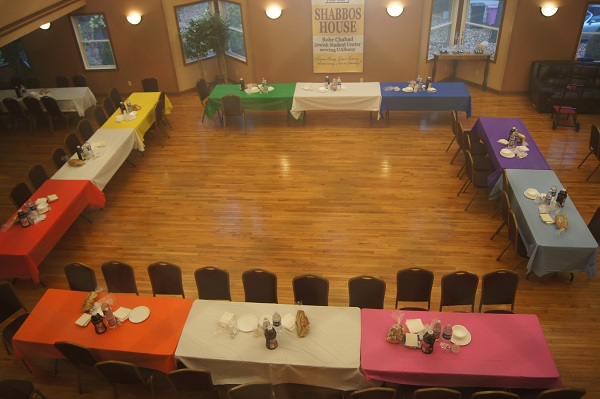 So by now most of you realized that tonight’s unusual table set-up and colored tablecloths reflect the property groups on a Monopoly board. A Monopoly Shabbat! Why a monopoly board? It ties into two things from this week’s Torah portion of Lech-Lecha, and another life-lesson and message or two for overall Jewish life.
So by now most of you realized that tonight’s unusual table set-up and colored tablecloths reflect the property groups on a Monopoly board. A Monopoly Shabbat! Why a monopoly board? It ties into two things from this week’s Torah portion of Lech-Lecha, and another life-lesson and message or two for overall Jewish life.
1) Tonight I’m speaking from a different corner of the room. This spot is… you got it, I’m at Go! right between the blue of Boardwalk and the purple of Baltic Ave.
What happens when you pass Go? That’s right, almost everyone knows that you collect $200 when you pass Go! you get this $200 for no other reason than passing go. It has nothing to do with how much or little you have in bank account, whether or not you own property, or what type of playing piece you are using. If you pass Go! you collect $200. Period.
In this week’s Torah portion G-d tells Abraham to Go, Lech Lecha, and then blesses him just for taking that journey.
(Rashi explains that usually there are losses when traveling. You aren’t settled, you are on the road and in unfamiliar territory. But here G-d blessed Abraham that not only would there be no loss, but even more so, he would be blessed by taking this trip).
2) Let’s take the Monopoly parallel a little further. You can only buy and establish properties that you land on. Similar to what G-d tells Abraham in this week’s Torah portion: “Arise, walk through the length and breadth of the land, for I will give it to you.” Avraham walked the land, so his descendants could later live and thrive there. You can’t build hotel or collect rents until you actually landed on that spot. You have to be in it to win it.
3) Jake walked in here tonight, assessed the situation and without hesitation asked me where he could find Boardwalk and Park Place. Good Great Neck thinking. But its not always about the fanciest or most expensive properties. As seasoned monopoly players (and long-term real estate investors) know: do not underestimate less glamorous properties on the board. Yes, they may be cheaper and plainer properties, maybe not as fancy or attractive. But if you are persistent and if you are invested, you can do very well.
Jewishly, some of us tend to put all their religious energies into a couple of important holidays or even Shabbat, but ignore the potential and spiritual opportunities available on regular Mondays and Tuesdays, on the Virginia, Indiana, Marvin Gardens or even the Baltic Avenues of our lives.
4) The largest monopoly on the board, which has the highest statistical probability of fellow players landing on them are the Railroads, or Airports in newer game editions. That’s because some properties are only two in a set, most are 3 in a set, but the Railroads and Airports are 4 in the set, if you have all 4. This is significant because the railroads and airports emphasize the power of going. You get $200 just for passing Go!, and you stand to benefit a great deal if you own all the railroads. Movement is what matters.
Guys, what’s exactly opposite from the Go! box? It’s Free Parking. Free Parking is diametrically opposed to Go! You couldn’t be more opposite. The Monopoly game rewards Passing Go, but doesn’t reward Free Parking. Don’t stop here.
OK, some of you are saying that in some game versions, there are House Rules (like a minhag) that reward Free Parking with all the money in the pot from Luxury Taxes and Chance cards and such. I can’t deny that this is the custom for some. But I looked this up, and the original Monopoly rules (the original Halacha!) DO NOT reward Free Parking.
Judaism is like that. G-d’s call to Abraham, LechLecha, was not just a historical one to one man and his family a couple of thousand years ago. This Lecha Lecha call is eternal. It is a call to each of us, throughout history down to modern times. G-d tells each of us: Keep on moving, keep growing, never be satisfied, continue the journey!
It was indeed quite a memorable Monopoly Shabbat….
